|
||||||||
|
|
|
2018-10-29 ArtNo.46429
◆Review:The baptism of the Holy Spirit (Five Trees in Paradise)
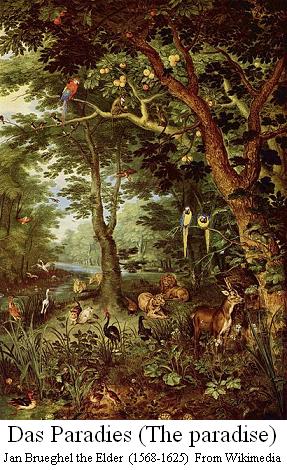 Jesus said, "Blessings on one who came into being before coming into being. If you become my followers and listen to my sayings, these stones will serve you. For there are five trees in paradise for you; they do not change, summer or winter, and their leaves do not fall. Whoever knows them will not taste death." (Thomas 19) --------- 'One who came into being before coming into being' means the supreme God (propator) who has come into being before the whole creation existing now and having existed in past coming into being and seems to be synonymous with "one who stands at the beginning" in the previous verse (Thomas 18). The Supreme God who dwells in all creations is none other than our 'original self.' 'If you become my followers and listen to my sayings' means 'if you only through this self-awareness understand Jesus' symbolic language,' in other words, 'if you find out your original Self which have been one with Supreme God,' then you will be the Lord of all creation, and 'these stones will serve you.' 'Five trees in paradise' seem to have been considered the Five Manifestations of Supreme God. According to a distinguished Assyrian exegete and apologist of the Church of the East, Theodore Bar Konai, who appears to have lived during the reign of Timothy I (780–823), Patriarch of the Church of the East, they are sanity, reason, mindfulness, imagination and intention. "Blessings on one who came into being before the creation of the world. I am the one. If you become my followers and find out your original Self, you will have five trees in paradise and will not taste death," preaches Jesus of the Gospel of Thomas. ○Similarity between 'the Gospel of Thomas' and 'Q source' 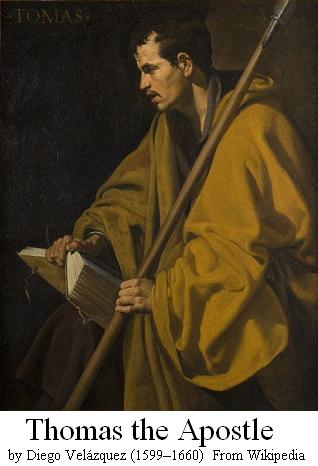 The content of the Gospel of Thomas, that was found in Coptic manuscripts, which had been discovered in Nag Hammadi on the Upper Nile in 1945, is very similar to Q Source, Hypothetical written collection of sayings of Jesus which might have been commonly referenced by writers of synoptic gospels, that is, the Gospels of Matthew, Mark and Luke. Therefore the hypothesis was virtually proved. However, contrasting 'synoptic gospels' and 'the Gospel of Thomas,' we can find that quite a few parallel verses in 'the Gospels of Matthew, Mark and Luke' are not there in 'the Gospel of Thomas.' In addition to it, parallel verses in 'the Gospels of Matthew and Luke,' but not in 'the Gospel of Mark,' are also not in 'the Gospel of Thomas,' and many of them are quotes from the Old Testament. These parallel articles seem to have been supplemented in response to the new situation after the Jewish war and reflect the positions of Hebraists, who used 'the Gospel of Matthew,' and Hellenists, who used 'the Gospel of Luke,' and conflicting relationship between them. The following is an example of a parallel article showing definite differences between the two gospels. ○Subtle differences in parallel articles of Gospel of Matthew and Luke 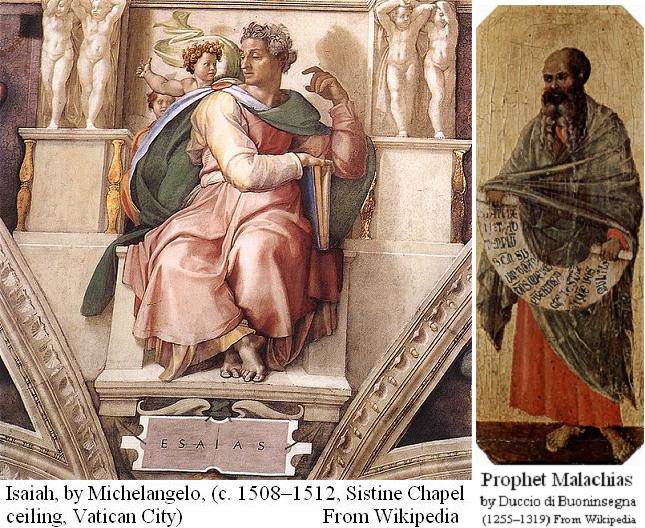 Jesus chose twelve disciples as his apostles and embarked on a systematic missionary activity. (Mat 10:1-42) When John heard in prison what Christ was doing, he sent his disciples to ask him, "Are you the one who was to come, or should we expect someone else?" Jesus quoted the description from the Old Testament Isaiah (Isaiah 35:4-6) and replied, "Go back and report to John what you hear and see: The blind receive sight, the lame walk, those who have leprosy are cured, the deaf hear, the dead are raised, and the good news is preached to the poor. Blessed is the man who does not fall away on account of me. (Mat 11:2-6)" As John's disciples were leaving, Jesus began to speak to the crowd about John: What did you go out into the desert to see? A reed swayed by the wind? If not, what did you go out to see? A man dressed in fine clothes? No, those who wear fine clothes are in kings' palaces. Then what did you go out to see? A prophet? Yes, I tell you, and more than a prophet. This is the one about whom it is written: 'I will send my messenger ahead of you, who will prepare your way before you. (Malachi 3:1)' I tell you the truth: Among those born of women there has not risen anyone greater than John the Baptist; yet he who is least in the kingdom of heaven is greater than he. From the days of John the Baptist until now, the kingdom of heaven has been forcefully advancing, and forceful men lay hold of it. For all the Prophets and the Law prophesied until John. And if you are willing to accept it, he is the Elijah who was to come. He who has ears, let him hear. (Mat 11:7-15)" The above article from 'the Gospel of Matthew' is a scene where Jesus declared that he himself was the Savior and John the Baptist was the Elijah, a harbinger of the Messiah, quoting 'the Book of Isaiah' and 'the Book of Malachi' of the Old Testament. It seems that the theological position on the Savior of Jesus' younger brother James who served as the high priest for the Nazirites, a faction of fundamental Judaism, entering into the holy areas of the Temple and led the newly established Jerusalem Church, is reflected here. Similar parallel articles exist in 'the Gospel of Luke.' (Luke 7:24-28) However, 'the Gospel of Matthew' contains a hard to understand and objectionable passage as follows; "From the days of John the Baptist until now, the kingdom of heaven has been forcefully advancing, and forceful men lay hold of it. (Mat 11:12)" There is certainly a similar parallel article also in 'the Gospel of Luke.' But Jesus says abruptly in a different scene, "The Law and the Prophets were proclaimed until John. Since that time, the good news of the kingdom of God is being preached, and everyone is forcing his way into it. (Luke 16:16)" Against the same phenomenon that occurred after John the Baptist, while the Gospel of Matthew is alarming that the kingdom is attacked and is in imminent danger, but the Gospel of Luke celebrates that those who heard the gospel are rushing into the kingdom. ○The composition of conflict between Hebraists and Hellenists 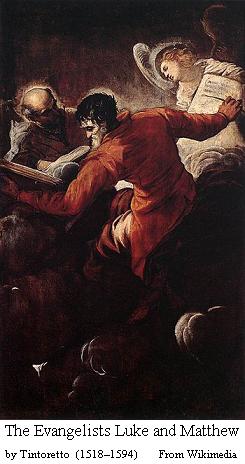 'The First Epistle of John' says, "This is how you can recognize the Spirit of God: Every spirit that acknowledges that Jesus Christ has come in the flesh is from God, but every spirit that does not acknowledge Jesus is not from God. This is the spirit of the antichrist, which you have heard is coming and even now is already in the world." (1 John 4:2-3) And 'the Second Epistle of John' says, "I say this because many deceivers, who do not acknowledge Jesus Christ as coming in the flesh, have gone out into the world. Any such person is the deceiver and the antichrist." (2 John 1:7) If anyone comes to you and does not bring this teaching, do not take them into your house or welcome them. Anyone who welcomes them shares in their wicked work." (2 John 1:10-11) And 'the Book of Apocalypse' picks up the practices of the Nicolaitans and condemns that their practices are abominable immorality as is Idolatry. The Gospel of Matthew' s alarm, that is, the forceful men, who are advancing against the kingdom of heaven and going to lay hold of it, are none other than the people who are condemned by 'the First and the Second Epistle of John' and by 'the Book of Apocalypse' On the other hand, Paul says in the Second Epistle to the Corinthians, "Wherefore we henceforth know no man after the flesh: even though we have known Christ after the flesh, yet now we know him so no more." (2 Co 5:16) He also says in the Epistle to the Galatians, "The gospel which was preached of me is not after man. For I neither received it of man (lifetime Jesus himself), neither was I taught it, but by the revelation of Jesus Christ (resurrected within Paul himself) (Ga 1:11-12)." And he affirms, "whatsoever they (pillars of Jerusalem Church, such as James the Less, Peter and John) were, it makes no matter to me." (Ga 2:6) Thus, the statement in 'the Gospel of Luke,' saying, "The Law and the Prophets were proclaimed until John. Since that time, the good news of the kingdom of God is being preached, and everyone is forcing his way into it (Luke 16:16)," seems to indicate the group of the Gentile Church led by Paul and Luke itself, in other words, believers of Jesus not after the flesh. 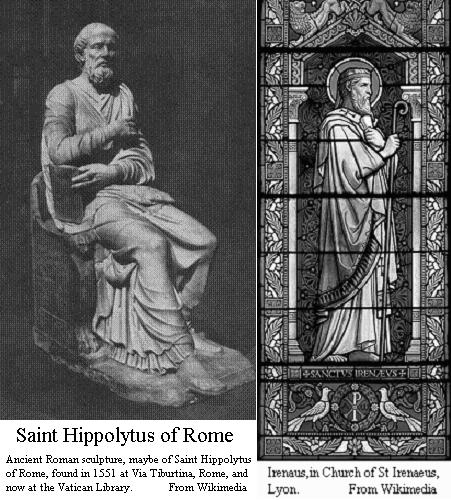 ○Reconciliation The Christian church has overcome such hostility and confrontation since the 4th century and those four Gospels — Matthew, Mark, Luke and John — have come as the canon of the New Testament. By the way, Valentinus, who is recognized as the founder of so-called 'Valentinian Gnosticism,' is said to have claimed that he learned Paul's secret teaching from Theudas, one of Paul's own disciples, and received from him some kind of apostolic sanction and authority. The Naassenes claimed to have been taught their doctrines by Mariamne, a disciple of James the Just. Hippolytus (170?-235), one of early church fathers, regarded them as among the first to be called simply 'Gnostics' However, originating from Smyrna of Asia Minor, Irenaeus (130-202), who was the Bishop of Lyons in Gaul in the second century, condemns the Gnostic Gospels, such as 'Gospel of Judas' as fake and heretic in his book titled 'Adversus haereses (Against Heresies),' while he emphasized that the four Gospels — Matthew, Mark, Luke and John — were the four pillars of the church. ○Source of teachings of wisdom Following the Syncretism (cultural fusion of east and west) was accelerated by the east expedition of Alexander the Great in the late 4th century BC, the Mahayana Buddhism movement and the Church movement occurred coincidently in the northern part of India and around the Mediterranean coast respectively and the teachings of wisdom ('prajna paramita' in Sanskrit, 'gnosis' in Greek), which could lead people to ultimate salvation through awareness of the original Self, flourished in each of them. 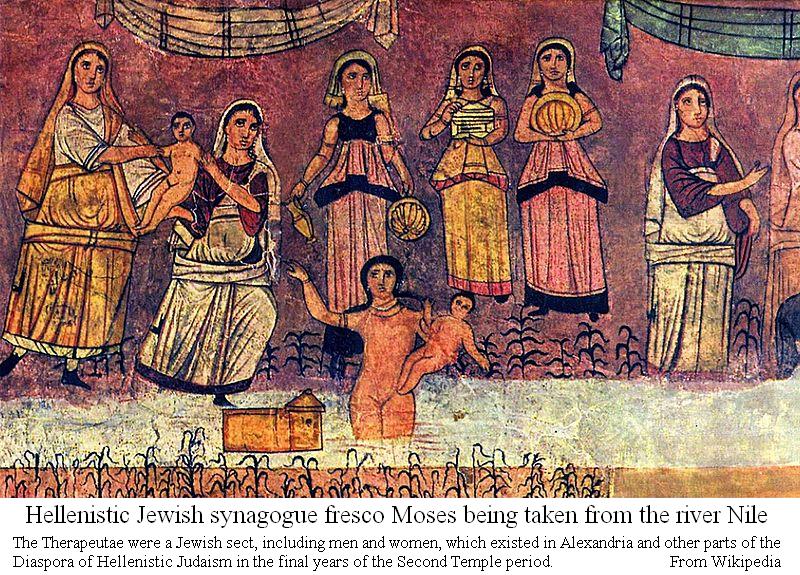 Under the tide of Gnosticism which had critically absorbed Judaism, the scholars in Alexandria actively attempted to fuse Judaism with Greek philosophy. On the other hand, after the death of Alexander the Great, the Mauryan dynasty brought almost all of India under its control by the year 232 BC. King Ashoka, the 3rd King of the Maurya Dynasty, dispatched Buddhist missionaries over 256 times to Seleucid Persia, Ptolemaic Egypt and even Greece. According to "The Original Jesus - Buddhist Sources Of Christianity by Elmer R. Gruber & Holger Kersten," the Jewish historian Philo (20/30BC-40/45AD), who was a leader of Jewish community in Alexandria, wrote that a religious and vegetarian brotherhood called the Therapeutae, who had advocated poverty, celibacy, obedience, good deeds, compassion and meditation and had laid aside all worldly goods including their relatives, had lived in the area south of Alexandria near Lake Mareotis. The book says, "They seems to have been descendants of missionaries who had been dispatched to Alexandria by King Ashoka at the era of Ptolemy II Philadelphos and Jesus too might have studied there when he was young." Jesus says, "If you hold to my teaching, you are really my disciples. Then you will know the truth, and the truth will set you free," in the Gospel of John. (John 8:31-32) While Gnostic factions regard Jesus as the founder of Gnosticism, Paul, James and Peter too can be said to belong to Gnosticism in a broad term because they all preached the faith based on a inner sprit of each person. ○Kitchen pantry and Three gates 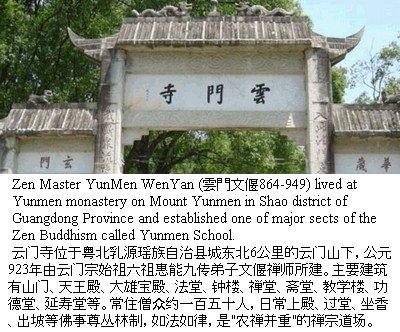 Time passed to the later period of the Tang Dynasty and the five dynasties and ten kingdoms period (907-960) in China, Zen Master YunMen WenYan (雲門文偃864-949), who lived at Yunmen monastery on Mount Yunmen in Shao district of Guangdong Province and to have established one of major sects of the Zen Buddhism called Yunmen School, one day delivered a sermon to the congregation and asked, "Everyone has his own bright light. When you look at it, you don't see it and it's dark and dim. What is everybody's light?" He himself answered on their behalf, "The kitchen pantry (厨庫) and three gates (三門)." Again he said, "A good thing isn't as good as nothing." Incidentally during the later period of the Tang Dynasty and the five dynasties and ten kingdoms period, five Houses and seven Schools (五家七宗) lined up and Zen Buddhism grew explosively. Each school of Zen Buddhism has distinctive pedagogical methods or formulas. And as usual, within one sentence of YunMen, three sentences are bound to be present. These are called the sentence that encloses heaven and earth, the sentence that follows the waves, and the sentence that cuts off the myriad streams. His pedagogical method is naturally extraordinary. He clutches a student who meets him together with heaven and earth at once and then shears myriad streams of his earthly desires just like cut-ting nails and let him go. However, Zen Master YunMen in this koan (Koans are subjects which Zen masters give their students in the meditation hall) recorded in 'The Blue Cliff Record Case 86' appears to have played soliloquy. Subtracting his birth year from his death year, Master YunMen should have enjoyed longevity of 85 years old. Apparently, this koan seems to have been expressed the full scale of enlightenment that the Zen master reached over his lifetime. Here may need to explain a little about the composition of the Zen temple. Regarding the kitchen pantry, the stuff of secretariat of Zen temple, including Dianzuo(典座) who is mainly in charge of food and catering, stays there and manages general affairs of the temple. Originally a Zen temple had three gates (三門) called the outer gate (外山門), the middle gate (中門)and the main gate (正門). Later it had only one gate with a large door in the center, a small door on each of the left and right and the gate was still called Sanmon (三門) but was used as same meaning with Sanmon (山門) in Japanese pronunciation. At that time, even in case of the head temple of 'five Houses and seven Schools (五家七宗),' it became a large household with hundreds to over 1,000 monks and sometimes received imperial messenger's visiting. Therefore, the day-to-day operation of the kitchen pantry must have been extremely busy. When YunMen first entered the priesthood, he should have just concentrated on sitting meditation but after being in charge of secretariat of the temple, there might have been no difference between priesthood and lay any longer. Especially after becoming the founder of Yunmen School, his anxiety would have been nothing to that of secretariat. 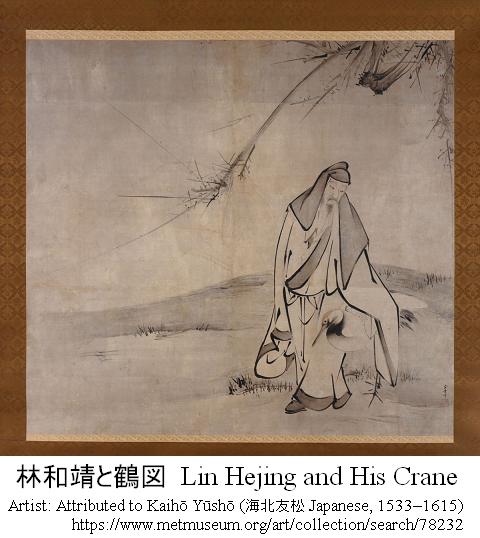 Dogen Zenji(道元禅師:1200-1253), the founder of the Japanese Soto Zen School(曹洞宗), who had built Eiheiji (永平寺) temple, wrote six texts on monastic practices, that is, Instructions for the Cook (典座教訓 Tenzo kyōkun) Procedures for Pursuing the Way (辨道法 Bendō hō) Procedures for Taking Food (赴粥飯法 Fu shukuhan pō) Regulations for the Common Quarters (衆寮箴規 Shuryō shingi) Regulations for Treating One's Seniors (對大已法 Tai taiko hō) Rules of Purity for Stewards (知事清規 Chiji shingi). Thus even Dogen Zenji who had raised 'Shikandaza (只管打坐: to practice zazen wholeheartedly)' as the sole banner of his Soto Zen School, paid extraordinary attention to the operation of Eiheiji temple. Chinese famous poet Lin HeJing (林和靖967-1028), who is said to have ended his life with plum trees as his wife and cranes as his children by the Lake Xihu (西湖) of Hangzhou (杭州) in Zhejiang Province (浙江省), was written in a poem as follows; Don't you see hermit Lin of Lake Xihu, he enjoys his whole life pleasure just watching plum blossoms (不见西湖林处士,一生受用只梅花。), Then, if Zen Master YunMen was asked his whole life pleasure, he must have answered "the kitchen pantry and three gates," too. In other words, extremely busy day-to-day operation of the kitchen pantry is none other than the substance of everyone's inherent bright light. If you ask a Japanese Zen priestess, "What do you mean by 『日々是好日(every day is a good day)』?" She might answer "『雨は降る薪は濡れる日は暮れる赤子の泣くに瘡の痒さよ(Rain falls, firewood get wet, the sunset is near and a baby starts crying. Why do my chappy hands begin to itch at such a time?)』" Thus Zen Master YunMen also seems to have perceived that "People had better not have good day."<To be continued> [Reference] ○The five trees in Indra's paradise 1. mandara (Erythrina stricta) 2. parijata (Nyctanthes arbor-tristis) 3. samtanaka (a tree of wonder having leaves which promote fertility in men; its identification remains obscure) 4. haricandana or sandalwood (Santalum album) 5. kalpa vrksa or kalpa taru There is a theory that Jesus traveled to India during his "missing" years from in the Bible. (Wikipedia) ○《The Blue Cliff Record》 Case 86: Kitchen Pantry and Three Gates 【Pointer】 He holds the world fast without the slightest leak; he cuts off the myriad flows without keeping a drop. Open your mouth and you're wrong; hesitate in thought and you miss. But tell me, what is the barrier-penetrating eye? To test, I cite this to see: 【Case】 Yun Men imparted some words saying, "Everyone has his own bright light; when you look at it, you don't see it and it's dark and dim. What is everybody's light? " He himself answered on their behalf, "The kitchen pantry and the three gates." He also said, "A good thing isn't as good as nothing." 【Verse】 Spontaneously shining, ranged in the solitary light. He opens a route for you. Flowers fall, the tree has no shadow When looking, who doesn't see Seeing or not seeing Riding backwards on an ox, entering the Buddha shrine. 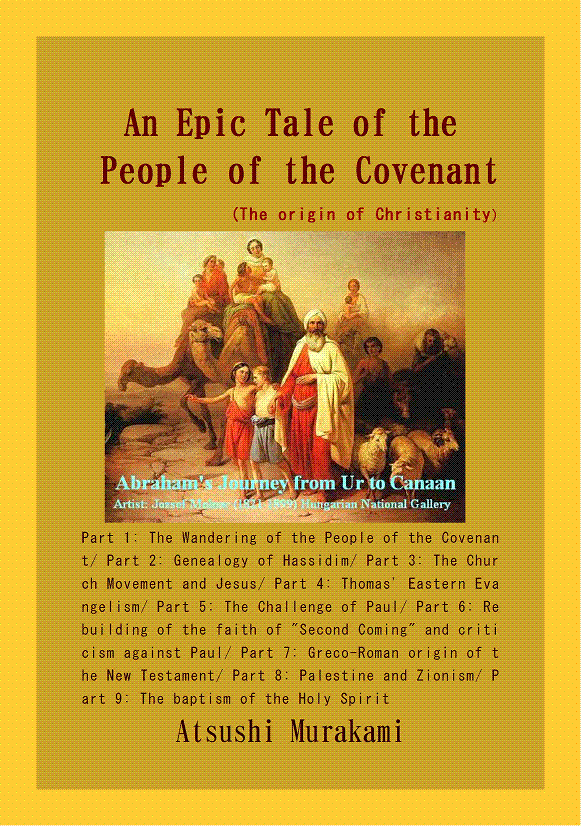 ○What is "Baptism with The Holy Spirit"? According to the dialectic of the Gospel of John, 【Thesis】"A man can possess eternal life through accepting testimony of the Son of man and being baptized by him." (John 5:24) 【Anti-thesis】But "The one who comes from the earth cannot accept the testimony by one from heaven." (John 3:32) How then can a man possess eternal life? 【Synthesis】"If you want to be baptized with the Holy Spirit, you can just go back to the word which was with God in the beginning (John 1:1) and certify that God is truthful. (John 3:33)" When he said, "You are Huichao," Zen Master Fayan thrusted vivid Self in Huichao in front of his eyes. Purchase here ○One world:The aim of SEAnews ◆Recruitment of Ad-SEAnews CanvassersYour Comments / UnsubscribeSEAnews TwitterSEAnews MessengerSEAnewsFacebookSEAnewsGoogleSEAnews eBookstoreSEAnews eBookstore(GoogleJ)SEAnews world circulation |
|
[Your Comments / Unsubscribe]/[您的意见/退订]/[ご意見/配信停止]
Please do not directly reply to the e-mail address which is used for delivering the newsletter. 请别用递送新闻的邮件地址而直接回信。 メールをお届けした送信専用アドレスには返信しないで下さい。 |